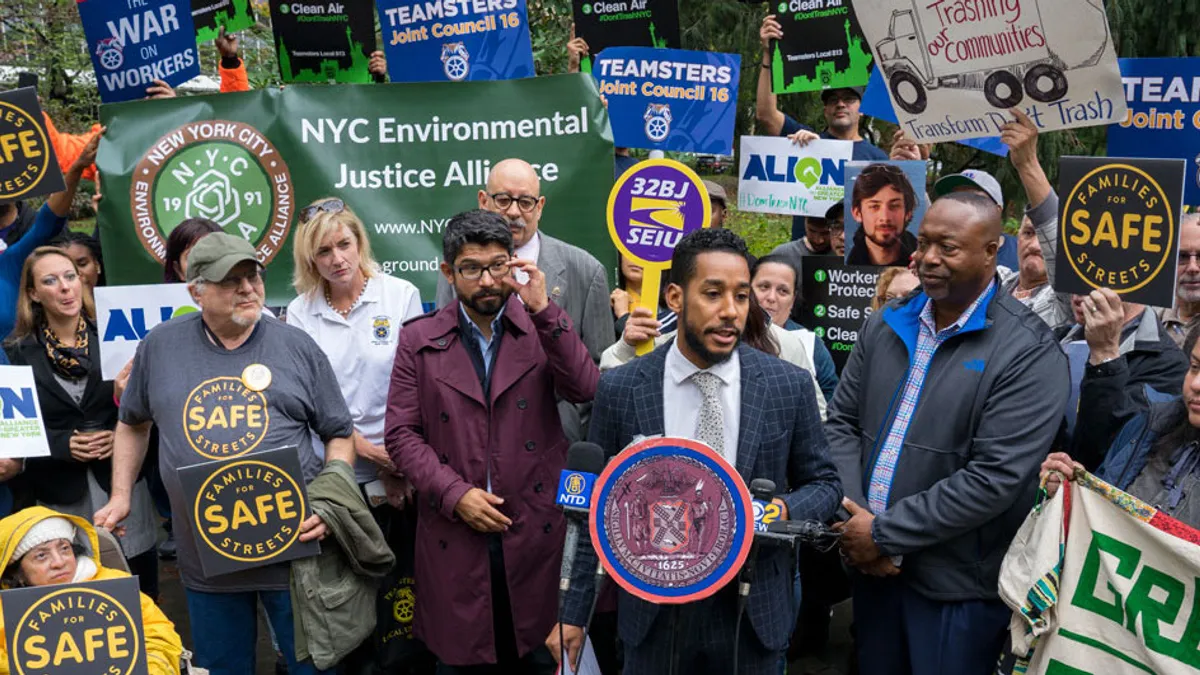The adage that waste issues are local has always been especially true in New York. This fall, the New York City Council made that abundantly clear by passing some of the most consequential legislation for any U.S. market in 2019.
New York has seen its share of changes since commercial waste collection was privatized more than 60 years ago — including a high-profile crackdown on organized crime in the 1990s — but a planned move to franchise zones may be the biggest yet. Following a multi-year reform campaign, council leadership made this a reality on Oct. 30 amid intense debate.
“Many people told me today would never happen, that the system was too complex to be meaningfully reformed, that the politics were too difficult, and until today history had proven those naysayers right," said Council Member Antonio Reynoso, the bill's primary sponsor, from the floor on that fateful afternoon. "We’ve persisted for six straight years to reach today’s vote and I am gratified to say to you today that the righteous cause has prevailed.”
Opponents – both on the floor and off – derided the bill as a job killer and a Wall Street giveaway. Supporters said it was likely one of the biggest pro-environmental bills they'd ever voted on. Council Speaker Corey Johnson repeatedly emphasized his pride in the proposal and its ultimate victory. After helping enact a similarly controversial transfer station capacity reduction bill in 2018, Johnson viewed this as the defining move to truly shake things up.
"Council Member Reynoso has worked diligently, thoughtfully, unbelievably hard from when we passed that bill a year and a half ago to today," said Johnson ahead of the vote. "I am so proud of the work that he has done on this bill ... There wasn’t total agreement on what we had to do, but I think he handled this responsibly and showed a tremendous amount of leadership."
While zoning legislation of any kind would have been significant, Reynoso and his allies took the additional step of advancing a plan that went beyond what Mayor Bill de Blasio's administration had backed for the past year. The differences remained cordial throughout, but the final version ended up including both slots for fewer companies and more requirements than before.
The message from this was clear: the goal wasn't just to change New York's commercial waste industry, but to disrupt it as much as possible. In a year of other big moves – Baltimore's Clean Air Act, California's attempted packaging EPR bill – the New York City Council's move was similarly targeted, but more locally consequential.
It will take years for the full implications of this to be understood, given the complexities of contract solicitation and transition, but major changes are expected. Some companies that either have poor records or can't compete with heightened bidding requirements may go out of business. Others may find ways to invest in their operations and win major new contracts. The largest among them, including some who don't currently operate in New York, may find ways to expand their market share more than ever before.
Granted, such prophecies haven't fully come true before. After a corruption crackdown 20 years ago upended the industry, the book "Takedown" wondered "if the city hadn't chased three hundred foxes from the henhouse, only to let in two or three lions." But those lions were never able to dominate as much as they expected and small carters still flourished decades later.
This time, the changes are intended to be more lasting and symbolic.
Now, the question council members will have to contend with in the years ahead – especially those seeking reelection or higher office in 2021 as implementation begins – is whether their willingness to disrupt can be matched by the stamina to rebuild.




 Read more
Read more







